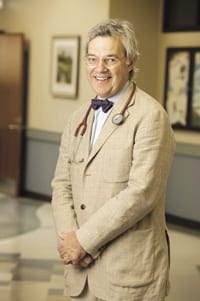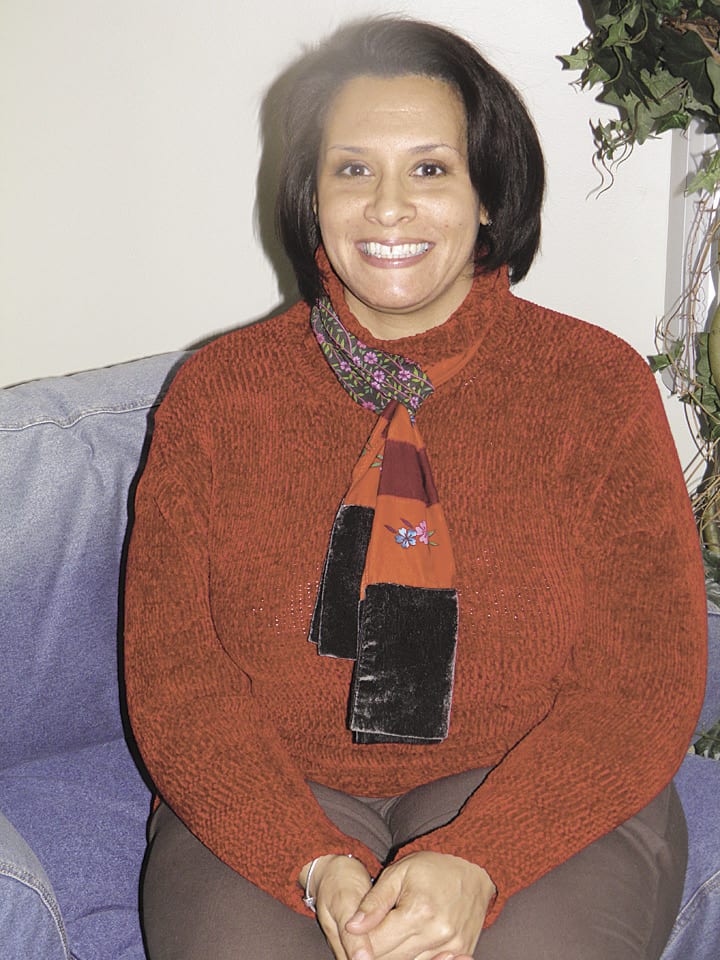A New Normal – Cancer Survivors Face Myriad Issues in a Never-ending Battle
Experts say a cancer diagnosis can result in positive life changes. But treatment for the disease can be all-consuming, and even if a person is declared cancer-free after radiation, chemotherapy, and/or surgery, it doesn’t mean they can return to their former lifestyle.
“Cancer survivor ship is a complicated story,” said Dr. James Stewart, chief of Hematology/Oncology for the Baystate Regional Cancer Program, adding that there are so many issues connected to the topic that books are being written about it and research and ongoing discussions make it a significant issue in the oncology world. “Survivorship doesn’t mean you are cured. It means you are living with or without cancer, so people need to have conversations with their physicians about what is likely to happen over the next 10 years.”
Dr. Philip Glynn agrees, and says survivors tend to have a variety of ongoing issues. Treatment can make them more prone to secondary malignancies, there can be consequences from surgery, and the drugs they are taking can have side effects.
“So much depends upon the disease, the extent of it, and the person’s ability to tolerate treatment,” said the director of medical oncology for Mercy Medical Center and the Sister Caritas Cancer Center, adding that many need psycho social supports in addition to medical help for ongoing problems.
Emotional repercussions can also prove daunting because relationships can change, including the patient’s feelings about their body. “It let them down once, so they think it can happen again. It takes a long time to rebuild trust, and life as they knew it may be completely different due to role changes,” said Marlene Quinlan, a licensed oncology social worker at the D’Amour Center for Cancer Care in Springfield. “People have to set their own limits. Just because they are done with cancer treatment doesn’t mean they are totally recovered. They need to pay attention to their body and learn how to manage their energy budget.”
Cheryl Gorksi, director of the CHD Cancer House of Hope in West Springfield, noted that, when people are undergoing treatment, they can’t wait for it to end so they can return to normal. “But it’s a new normal. There will be something different about them physically, emotionally, or spiritually and their colleagues, loved ones, and friends need to be mindful of that.”
There exist people who seemingly return to their former lifestyles as if cancer had never occurred. “But others have it on their minds all the time. They can’t let go, and with every ache or pain, they wonder if it has come back,” said licensed certified social worker Philomena Gajda from the Sister Caritas Cancer Center.
“So, what happens after treatment is as important as what goes on during treatment,” she told HCN, adding that support groups and therapy can be helpful. “There is life after cancer, and most people know it, but they have to work through their feelings and deal with their self-image before they can move on.”
After Effects
Long-term fatigue is a common problem after a cancer fight, and it can take years for someone to feel normal. There can also be memory or concentration issues that result from chemotherapy, along with sleep problems.
Other health issues may also develop. For example, a man treated for prostate cancer could become incontinent, have recurring diarrhea, or suffer from sexual dysfunction. In advanced cases, where androgen production is blocked, there can also be a loss of bone, body mass, and muscle strength, Glynn said.
“People have to set their own limits. Just because they are done with cancer treatment doesn’t mean they are totally recovered. They need to pay attention to their own body and learn how to manage their energy budget.”
“Someone who has been treated for neck cancer may have problems swallowing or with speech and eating. It may affect their sense of taste, and there can be nutritional issues,” he went on. “And someone with colorectal cancer who has had an ostomy [a surgically created opening to discharge bodily wastes] has to learn to care for it, along with changes in their body image. These things are very common, and people have to be followed closely for years after their treatment is over.”
As a result, frank discussions with physicians are important. “People need to have candid conversations about their goals and expectations,” Glynn said. “Talking about things such as sexual dysfunction can be very uncomfortable, but very important.”
When people feel overwhelmed, Stewart asks them to recall how they dealt with other traumatic events in their life. Coping skills used in the past typically work well, but many people need to develop new strategies as their life continues to change.
“When you ask people when they began to feel normal, they often describe it as a new normal,” said Stewart. “Some say they are better off, while others worry every day. There are an infinite number of stories.”
The stories begin with the person’s diagnosis. The word ‘cancer’ invokes fear, Stewart said, but although the disease can be life-threatening, not all cancers are invasive. “Cancer is 100 different diseases; it’s predominantly a disease seen in older adults, but Nixon’s War on Cancer and other campaigns have exacerbated the emotions associated with a diagnosis,” the oncologist explained. “Heart disease is a major cause of death, but those words don’t cause the same fear. The word ‘cancer’ has gotten a bad reputation.”
Emotions run the gamut from anger to depression, and Gajda says people should not try to cope alone. “You need to find someone you can talk to and confide in. Isolation won’t help and will only lead to depression. However, people are very strong and can bounce back quickly once they come to terms with themselves.”
She advises friends and relatives to be supportive. But some patients discover their friends are unwilling to discuss the disease or how they feel. “People may have friends who were very close to them who are no longer able to give them the support they need,” Quinlan said.
Others perceive them as selfish or self-absorbed because they spend their time and/or money focusing on new interests. “But all they are trying to do is take care of themselves, and people who love them need to respect that,” Gorski said, adding that the Cancer House of Hope offers many services and support groups, all of them free of charge.
Recovery Process
Stewart said people are often smothered with care by medical professionals while they are undergoing treatment. But the question is, what happens when it ends?
Quinlan agrees that patients typically are supported during the early stages of their disease. “During that time, their lives are dominated by what is happening with their treatment. But when it ends, they need to rethink things, such as whether they will return to work and how they can re-establish their lives while dealing with lingering effects from treatment,” she said. “They have to redefine what is important to them. Many say they have been given a second chance and want to make the most of it. And their new normal can be dramatically different or just slightly different.”
But whether or not they decide to make major changes, “it’s a profound experience that doesn’t leave you. People are not the same afterwards existentially,” Quinlan continued.
And the effects can last for decades. “A 20-year-old treated for Hodgkin’s disease, which is very often curable after treatment with chemotherapy and radiation, has a long life to live but may be at risk for other cancers,” Glynn said. “There is a price to pay for cancer treatments, and the person may need followup visits with an oncologist for the rest of their life.”
He said that people should keep copies of their medical records. “There are hundreds of drugs that can be used in treatment, and if the cancer returns, their doctor will need to know what they were given.” Survivors must also make decisions about what they want done if the cancer returns and is pronounced incurable, or if they need to be admitted to the intensive-care unit.
Gorski said part of the fear involves another round of treatment. “People say they never want to go through it again. They have been traumatized by the experience, and it can be a time of big life changes, such as a divorce or breakup. Mortality really hits hard, and there are still doctor’s appointments or conditions like lymphedema that arise,” she said, referring to a blockage of the lymph vessels that drain fluid from tissues throughout the body.
In addition, the disease takes its toll on the person’s family and friends. These issues all complicate recovery, which is often slower than someone would like. “The process is up and down,” Quinlan said. “Someone may feel better for three days, then worse again for the next three days. Although they are moving forward, people are not patient. Some feel like they can will themselves to feel better because they have expectations based on how they were prior to the diagnosis.”
Recovery can be especially difficult for parents of young children because they may continue to fear their mom or dad will die. “Communication needs to remain open. But don’t share the worstcase scenario with them,” Gajda said. “Tell them you had a rough journey, but you will be OK. Just give them a few facts they can understand.”
Gorski concurs. “Children don’t like to see their parent sick and don’t understand the disease. They can’t always express their feelings, but they also live in fear of a reoccurrence, so it’s important to have a dialogue with them,” she said, adding that, since some children are not comfortable talking to parents about their emotions, it may be prudent to seek out a counselor or another objective party.
It’s also difficult for women who have put their family’s needs before their own to shift their focus to their own health, Gorksi said. And relationships with a spouse can become strained. “We have seen instances where spouses left because of the cancer. There is a lot of stress, and some people are not equipped to be caregivers.”
Life Continues
Simple pleasures that people took for granted prior to their treatment can become significant afterwards. “There is a new gratitude, but people have to process what has happened and put all of the pieces together in a way that makes sense to them,” Quinlan said. “Survivorship is physical and emotional, and some people find a new spirituality as a result.”
Still, coming to terms with the new normal can require help.
“If your heart and mind are going in two different directions, you will never find peace,” Gajda said. “But if they are one, you can conquer anything.”






Comments are closed.